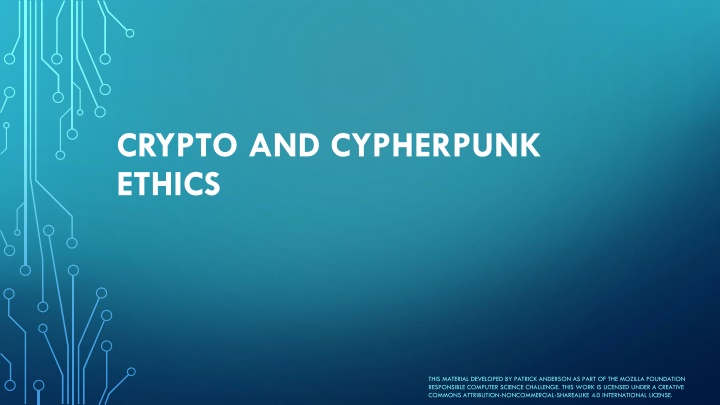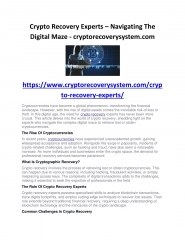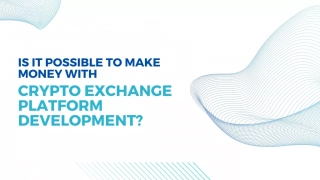
CRYPTO AND CYPHERPUNK ETHICS
This material, developed by Patrick Anderson as part of the Mozilla Foundation Responsible Computer Science Challenge, delves into the core components of ethical theory, exploring means, ends, desirable outcomes, permissible actions, and more within the context of crypto and cypherpunk ethics.
Download Presentation

Please find below an Image/Link to download the presentation.
The content on the website is provided AS IS for your information and personal use only. It may not be sold, licensed, or shared on other websites without obtaining consent from the author. If you encounter any issues during the download, it is possible that the publisher has removed the file from their server.
You are allowed to download the files provided on this website for personal or commercial use, subject to the condition that they are used lawfully. All files are the property of their respective owners.
The content on the website is provided AS IS for your information and personal use only. It may not be sold, licensed, or shared on other websites without obtaining consent from the author.
E N D
Presentation Transcript
CRYPTO AND CYPHERPUNK ETHICS THIS MATERIAL DEVELOPED BY PATRICK ANDERSON AS PART OF THE MOZILLA FOUNDATION RESPONSIBLE COMPUTER SCIENCE CHALLENGE. THIS WORK IS LICENSED UNDER A CREATIVE COMMONS ATTRIBUTION-NONCOMMERCIAL-SHAREALIKE 4.0 INTERNATIONAL LICENSE.
THE BASIC COMPONENTS OF ETHICAL THEORY Means Ends the ways the outcomes are pursued the desired outcomes; the results deemed good What ends are desirable and why? Which means are permissible and why?
LESSON A This material developed by Patrick Anderson as part of the Mozilla Foundation Responsible Computer Science Challenge. This work is licensed under a Creative Commons Attribution- NonCommercial-ShareAlike 4.0 International License.
THE WHO ARE THE CYPHERPUNKS? John Gilmore Eric Hughes Timothy May Privacy, technology, and the open society (1991) A Cypherpunk Manifesto (1993) The Crypto Anarchist Manifesto (1992)
BASIC VIEWS OF THE CYPHERPUNKS 1. The ideal society is an open society, a pluralistic society consisting of diverse religious, ideological, and moral worldviews and governed by mutual toleration. 2. Privacy is a necessary condition for an open society. 3. Technological solutions are preferrable to legislative solutions. 4. Cryptography is the technology that will protect privacy in the computer age.
READING QUESTIONS 1. According to Gilmore, what is the relation between privacy and an open society? 2. Why does Gilmore advocate the use of physics and mathematics to preserve privacy rather than laws ? 3. How does Hughes define privacy ? 4. Given the way Hughes connects privacy and cryptography, how does he seem to understand the moral meaning of cryptography? Identify at least one example. 5. What does May mean when he argues that cryptography might create the conditions for abhorrent markets ? Why or why not? 6. What does May mean when he says that cryptography creates so much openness that it will alter completely the nature of government regulation, the ability to tax and control economic interactions, the ability to keep information secret, and will even alter the nature of trust and reputation ?
DISCUSSION QUESTIONS, PART 1 1. Is the definition of privacy offered by Gilmore and Hughes satisfactory? Why or why not? If it is not satisfactory, what would be a better definition and why? 2. Gilmore argues that an open society is defined by its level of tolerance for difference, but no society can tolerate everything. There must be some line separating what a society will tolerate and what it will not tolerate. What are the limits to toleration? In other words, how to we differentiate things we should tolerate and things we should not tolerate? 3. To what extent is May correct when he says that cryptography creates so much openness that it will alter completely the nature of government regulation, the ability to tax and control economic interactions, the ability to keep information secret, and will even alter the nature of trust and reputation ? Does cryptography actually undermine current social relations?
DISCUSSION QUESTIONS, PART 2 4. To what extent is the cypherpunk emphasis on technical solutions to moral problems over legislative solutions to moral problems relevant to computer scientists and why? 5. Are the cypherpunks right about the relationship between privacy, tolerance, and an open society? Why or why not? 6. What role, if any, do computer scientists play in promoting the realization of an open society? What are the computer scientist s ethical obligations in such a role and why?
LESSON B This material developed by Patrick Anderson as part of the Mozilla Foundation Responsible Computer Science Challenge. This work is licensed under a Creative Commons Attribution- NonCommercial-ShareAlike 4.0 International License.
SECURITY VS. PRIVACY, OR SECURITY VS. SECURITY James Comey Susan Landau
THE GOING DARK PROBLEM ACCORDING TO COMEY If the communications provider is served with a warrant seeking those communications, the provider cannot provide the data because it has designed the technology such that it cannot be accessed by any third party In short, the same ingenuity that has improved our lives in so many ways has also resulted in the proliferation of products and services where providers can no longer assist law enforcement in executing warrants.
READING QUESTIONS 1. What does Comey mean when he claims that the FBI is going dark ? What seems to be the central moral problem that arises from going dark and why? 2. According to Comey, what role does cryptography play in the going dark problem? 3. What does Landau mean when she claims that the central issue is not a conflict between security and privacy but a conflict between security and security? What seems to be the central moral problem that arises from this security versus security story and why? 4. According to Landau, what role does cryptography play in the security versus security story ?
DISCUSSION QUESTIONS 1. In your view, which framing of the issue Comey s privacy versus security or Landau s security versus security is more convincing or insightful? Why? 2. How do computer scientists determine the ethical limitations of their technical contributions to law enforcement and national security agencies? In other words, what principle or principles can computer scientists use to decide when to accept or reject law enforcement and national security requests for technical assistance? 3. Based on what you know, what seems to be the most ethically sound solution to the law enforcement and national security problems the FBI claims to be facing and why? What would computer scientists have to do to help put this solution into practice?






















